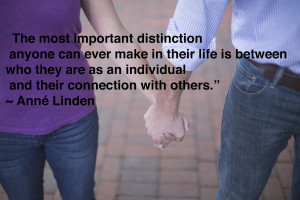Last week a Buzzfeed post was going around on Facebook: How Many Basic Life Skills Do You Have? A friend of mine wisely pointed out that none of these 100 Essential Life Skills were relationship skills.
I think if you’re able to have good relationships, you can probably find someone to help you “cook meat to a desired level.”
So here are my top 5 relationship skills. In putting together this list, I’m thinking mainly about romantic/love relationships, but they work for friendships, too.
1. Know How to Listen
Because I’ve been a Professional Listener for over 20 years, sometimes I forget that it’s actually a learned skill. I’m usually reminded how few people really know how to listen when I spend time with someone who isn’t a good listener.
First off, listening is *not* waiting for the other person to stop talking so you can share your story. Listening involves really following what someone is saying, and then asking questions to clarify or deepen your understanding of what the other person is saying. Listening involves having a reaction to what the other person is saying: do you let your face reflect your surprise, sorrow, anger, or enjoyment as your partner is talking? Do your comments reflect that you’ve understood what they’re saying?
Are you able to figure out the difference between someone really needing to vent or be heard, and to stay quieter at those times, and a conversation where the other person has the energy and ability to listen to you, too?
2. Know How to Apologize
True apologies don’t contain the word “but.”
“I’m sorry you feel that way,” is also not a true apology. If you’re sad that your partner is hurt but you really don’t think you did anything wrong, say that.
Don’t apologize if you didn’t do anything wrong. If there’s disagreement about that, you have to talk it out so you and your partner can figure out where the disconnect is.
If you have done something you’re sorry for, say it. Maybe even say it twice. I know – it’s hard. It’s hard to admit you’ve made a mistake. But a true apology goes a LONG way towards softening anger and maintaining connection. I’ve had partners tell me, “I can’t apologize because it gives them too much power.” And I always ask, “What exactly are you able to hold onto by withholding an apology? Your pride? Is it worth it?”
3. Know How to Fight Fair
When you share your life with someone, you’re going to have disagreements. There are going to be misunderstandings, and you’re going to make each other mad sometimes. That’s life. But knowing how to navigate through those times can make the difference between celebrating your 40th anniversary together, or once again paying the divorce lawyer.
Fighting fair means staying on topic. Figure out what the main point is that you want to get across, and stick to that. Take a time out to think if you have to. Most of us don’t think very clearly when emotions are running high. It’s a lot more productive to figure out that you need more help around the house and to say so, then to call your husband an F-ing asshole. If you’re furious, chances are pretty good that you’re going to come out with guns blazing, and your partner/co-worker/friend is going to feel attacked and nothing constructive is going to happen. Take a break to calm down and re-engage the rational part of your brain.
Fighting fair means no name calling. See above. The idea in fighting fair is to keep both of you from getting defensive and shutting down. Being mean is not going to further your interests. Ever. It just creates so much more hurt to clean up later.
Fighting fair also means not just getting your point across, but listening to your partner’s point of view. See #1.
4. Know How to Open Up
“What does it mean,’ he asked, ‘when she says she wants me to open up? I tell her how my day was. I tell her whatever she wants to know. I don’t know what else to do!”
Opening up means telling your partner about what’s going on inside you – what you’re thinking about your job, how you’re feeling about your parents’ aging, what is making you anxious, what is making you happy. Not everyone has practice articulating their inner life, and it’s possible your partner just isn’t used to anyone being interested in hearing about it.
Opening up is how we gain intimacy in relationships. It’s how we feel closer to each other. If you’re not very good at it, try to get better. That’s all anyone can really ask. A good faith effort goes a long way.
If you could open up, though, and are choosing not to, you may be withholding part of yourself from your partner, and your partner may be hurt by this. Some people are really all out there with everything, and some people hold their cards closer to their chest. It’s a personal decision, but if you’re partner continues to feel like you’re being distant or withholding, you might want to consider why you’d be afraid to be close to them.
5. Know When to Be Honest, and When to Be Kind.
Yep, I’m gonna say it. Honesty is overrated. Sometimes kindness is more important. Where’s the line? You’ll have to figure that out for yourself. Just trust me when I say that very few couples make it through the long haul without sometimes choosing kindness over honesty.
I’m not talking about keeping huge secrets or betrayals. I’m talking about telling your wife she’s gorgeous even (maybe especially) when she’s not feeling gorgeous. I’m talking about not criticizing your husband for the way he folds towels, and just quietly refolding them yourself if you have to. Or swallowing your annoyance about them being late again when they finally show up flustered and upset about whatever delayed them.
People get very touchy when I bring this up. “Aren’t we supposed to be able to say anything? Are you asking me to put all my needs aside?”
Of course not. All I’m saying is, let’s have a little tact and common sense. How important is the complaint you’re about to lodge? Really, really important? You’re not going to be able to sleep unless you address it? Then by all means, have at it. Let your feelings be known.
But is it a minor annoyance and maybe your partner’s had a bad day? Eh….consider letting it go. Maybe next time it happens the timing will be better and you can gently bring it up. Maybe not.
These are both the skills that I think help my husband and I stay happily married, and the skills that I think have been most important for the couples I’ve worked with. I know there are more, and I’m sure I’ll be writing more about them in the future. If there’s one I haven’t listed that you think is vital, please mention it in the comments.








